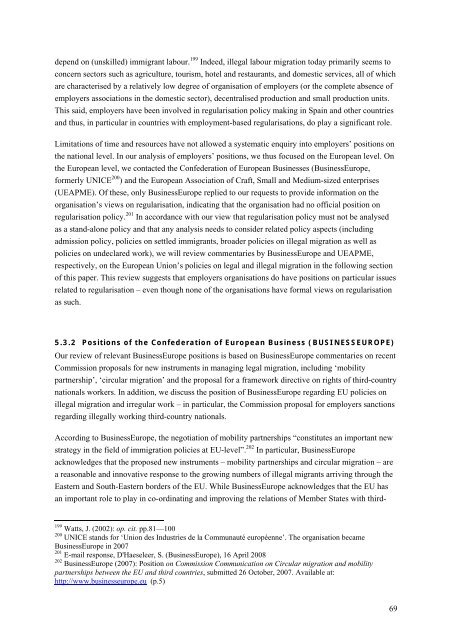REGINE Regularisations in Europe Final Report - European ...
REGINE Regularisations in Europe Final Report - European ...
REGINE Regularisations in Europe Final Report - European ...
You also want an ePaper? Increase the reach of your titles
YUMPU automatically turns print PDFs into web optimized ePapers that Google loves.
depend on (unskilled) immigrant labour. 199 Indeed, illegal labour migration today primarily seems to<br />
concern sectors such as agriculture, tourism, hotel and restaurants, and domestic services, all of which<br />
are characterised by a relatively low degree of organisation of employers (or the complete absence of<br />
employers associations <strong>in</strong> the domestic sector), decentralised production and small production units.<br />
This said, employers have been <strong>in</strong>volved <strong>in</strong> regularisation policy mak<strong>in</strong>g <strong>in</strong> Spa<strong>in</strong> and other countries<br />
and thus, <strong>in</strong> particular <strong>in</strong> countries with employment-based regularisations, do play a significant role.<br />
Limitations of time and resources have not allowed a systematic enquiry <strong>in</strong>to employers’ positions on<br />
the national level. In our analysis of employers’ positions, we thus focused on the <strong>Europe</strong>an level. On<br />
the <strong>Europe</strong>an level, we contacted the Confederation of <strong>Europe</strong>an Bus<strong>in</strong>esses (Bus<strong>in</strong>ess<strong>Europe</strong>,<br />
formerly UNICE 200 ) and the <strong>Europe</strong>an Association of Craft, Small and Medium-sized enterprises<br />
(UEAPME). Of these, only Bus<strong>in</strong>ess<strong>Europe</strong> replied to our requests to provide <strong>in</strong>formation on the<br />
organisation’s views on regularisation, <strong>in</strong>dicat<strong>in</strong>g that the organisation had no official position on<br />
regularisation policy. 201 In accordance with our view that regularisation policy must not be analysed<br />
as a stand-alone policy and that any analysis needs to consider related policy aspects (<strong>in</strong>clud<strong>in</strong>g<br />
admission policy, policies on settled immigrants, broader policies on illegal migration as well as<br />
policies on undeclared work), we will review commentaries by Bus<strong>in</strong>ess<strong>Europe</strong> and UEAPME,<br />
respectively, on the <strong>Europe</strong>an Union’s policies on legal and illegal migration <strong>in</strong> the follow<strong>in</strong>g section<br />
of this paper. This review suggests that employers organisations do have positions on particular issues<br />
related to regularisation – even though none of the organisations have formal views on regularisation<br />
as such.<br />
5.3.2 Positions of the Confederation of <strong>Europe</strong>an Bus<strong>in</strong>ess (BUSINESSEUROPE)<br />
Our review of relevant Bus<strong>in</strong>ess<strong>Europe</strong> positions is based on Bus<strong>in</strong>ess<strong>Europe</strong> commentaries on recent<br />
Commission proposals for new <strong>in</strong>struments <strong>in</strong> manag<strong>in</strong>g legal migration, <strong>in</strong>clud<strong>in</strong>g ‘mobility<br />
partnership’, ‘circular migration’ and the proposal for a framework directive on rights of third-country<br />
nationals workers. In addition, we discuss the position of Bus<strong>in</strong>ess<strong>Europe</strong> regard<strong>in</strong>g EU policies on<br />
illegal migration and irregular work – <strong>in</strong> particular, the Commission proposal for employers sanctions<br />
regard<strong>in</strong>g illegally work<strong>in</strong>g third-country nationals.<br />
Accord<strong>in</strong>g to Bus<strong>in</strong>ess<strong>Europe</strong>, the negotiation of mobility partnerships “constitutes an important new<br />
strategy <strong>in</strong> the field of immigration policies at EU-level”. 202 In particular, Bus<strong>in</strong>ess<strong>Europe</strong><br />
acknowledges that the proposed new <strong>in</strong>struments – mobility partnerships and circular migration – are<br />
a reasonable and <strong>in</strong>novative response to the grow<strong>in</strong>g numbers of illegal migrants arriv<strong>in</strong>g through the<br />
Eastern and South-Eastern borders of the EU. While Bus<strong>in</strong>ess<strong>Europe</strong> acknowledges that the EU has<br />
an important role to play <strong>in</strong> co-ord<strong>in</strong>at<strong>in</strong>g and improv<strong>in</strong>g the relations of Member States with third-<br />
199 Watts, J. (2002): op. cit. pp.81—100<br />
200 UNICE stands for ‘Union des Industries de la Communauté européenne’. The organisation became<br />
Bus<strong>in</strong>ess<strong>Europe</strong> <strong>in</strong> 2007<br />
201 E-mail response, D'Haeseleer, S. (Bus<strong>in</strong>ess<strong>Europe</strong>), 16 April 2008<br />
202 Bus<strong>in</strong>ess<strong>Europe</strong> (2007): Position on Commission Communication on Circular migration and mobility<br />
partnerships between the EU and third countries, submitted 26 October, 2007. Available at:<br />
http://www.bus<strong>in</strong>esseurope.eu (p.5)<br />
69
















